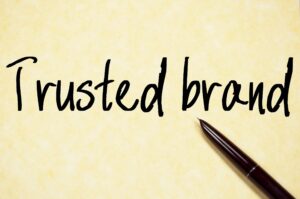
One fundamental truth reigns supreme in the B2B marketplace: trust is the cornerstone of every successful transaction. Whether it’s a large corporation vying for a lucrative contract or a startup seeking qualified investors, the currency of trust is essential for success. Why? People, especially in the B2B world, buy from brands they trust. They want to know that the brands they support understand their pain points and can deliver real value. No matter what the industry is, brand trust is instrumental to achieving sustainable business growth in the B2B marketplace.
New research from Forrester reveals just how essential trust is in the B2B marketplace. According to the study, the number one factor determining whether a company will work with you is whether they trust you. Moreover, buyers are nearly twice as likely to recommend a business they trust to colleagues (85 percent) versus one they don’t (48 percent).
Brand Trust and Why It Matters
Brand trust reflects the confidence that your customers and partners have in your business. Think of trust as a magic ingredient that keeps your audience coming back for more. The more your audience trusts your brand, the more confident they’ll be in a business relationship with your organization, even when you may not be the cheapest or fastest option available.
On the other hand, losing brand trust can have devastating consequences. It’s not only a hit to your organization’s reputation; it’s a blow to your business’s very foundation. Once trust is lost, it’s likely gone forever. For these reasons, it’s crucial to nurture and protect your brand trust at all costs.
Five Ways to Build Brand Trust
Here are five key strategies that can help you establish credibility and foster trust with your target audiences:
1. Operate with Honesty and Transparency
Today’s B2B buyers demand honesty, integrity, and transparency. Be upfront about your products, services, processes, and business practices. Proactively address questions and concerns. Operating honestly and with openness creates a sense of reliability and professionalism that resonates with your audience.
2. Thought Leadership Content Matters
Position yourself as an industry expert by consistently providing value through relevant, educational, and insightful thought leadership content. Share your knowledge and experience through bylined articles, in-depth blogs, speaking engagements, white papers, webinars, and other forms of brand-centric messaging. The more you can demonstrate your proficiency in understanding your audience’s pain points or other needs, the more your audience will see you as a trusted resource.
3. Be Consistent
Mixed messaging creates confusion, not trust. As such, consistency is key when it comes to building trust. Be consistent in your messaging, branding, and communication across all touchpoints. A style guide helps ensure visual consistency in the eyes of target audiences. This doesn’t mean you can never change things up or evolve over time, but too much inconsistency can undermine credibility and make you seem unreliable.
4. Maintain a Professional Online Presence
Maintaining a professional online presence is crucial for B2B marketers. Your website, social media profiles, and other digital platforms should reflect your brand values and convey recognized expertise. A well-maintained online presence can instill confidence in your audience and build trust over time. Also, take the time to examine your digital footprint from the perspective of your audiences and be willing to make adjustments as needed.
5. Admit Mistakes
Mistakes are all part of learning and growing. Mistakes happen, but when you slip up, own it, apologize, and explain how you’ll improve. Accountability for errors shows humility and integrity, ultimately building a foundation of trust. Don’t be discouraged by making mistakes—view missteps as opportunities to build trust with your audience.
Trust Starts Within

For most people, building and earning trust take time. It’s a gradual process that requires commitment and effort. But B2B companies don’t have years to build trust with their target audiences. Fortunately, there’s a powerful way to speed up the process. When leaders earn and nurture the trust of their employees, it can improve employee engagement, increase retention rates, enhance collaboration and innovation, and boost productivity. “The first job of a leader—at work or at home—is to inspire trust”, says Stephen M.R. Covey, author of The Speed of Trust: The One Thing that Changes Everything. “It’s to bring out the best in people by entrusting them with meaningful stewardships, and to create an environment in which high-trust interaction inspires creativity and possibility.” A positive organizational culture based on trust resonates with employees and, in turn, customers.
The effect of trust on a company’s target audiences is clear: increased sales, enhanced loyalty, and long-term organizational success. But the real impact of trust comes when it is built from within. Want to chat more about how to build trust with your audiences through marketing content? Reach out and schedule a call with one of our experts.
